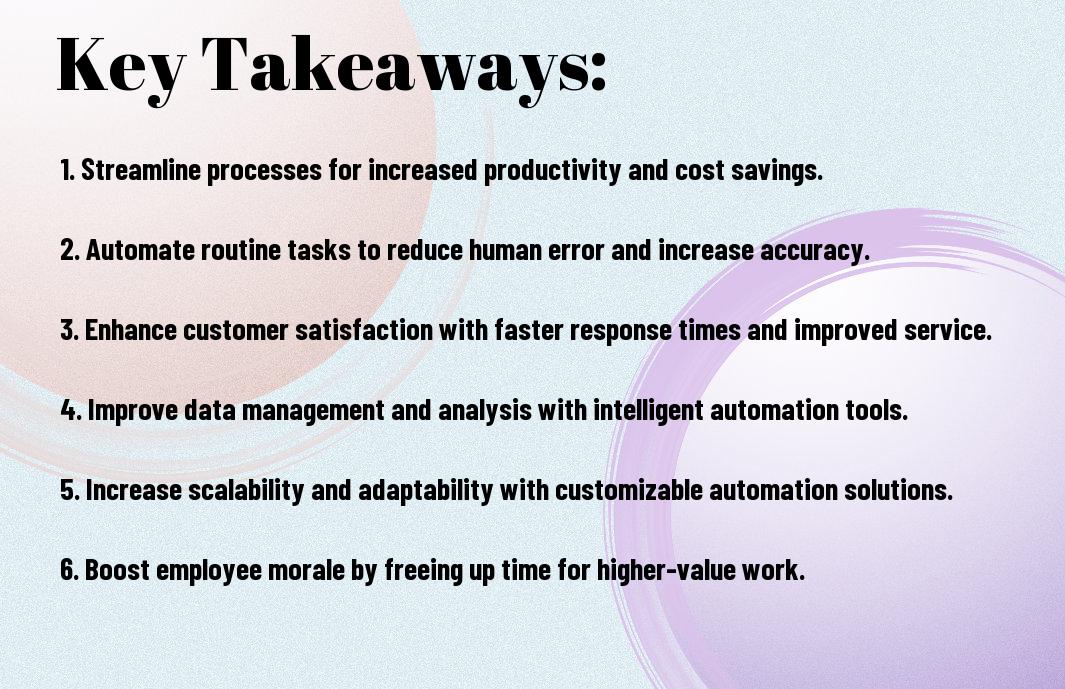Maximizing Efficiency With Intelligent Business Process Automation Services
Over the past decade, intelligent business process automation services have revolutionized the way companies operate, streamlining workflows, reducing manual tasks, and improving overall productivity. In this blog post, we will examine into the key benefits and strategies for implementing automation services to maximize efficiency in your organization. By leveraging cutting-edge technologies and smart algorithms, businesses can unlock new levels of operational excellence and drive sustainable growth. Let’s explore the power of automation in transforming business processes and achieving higher levels of performance.

Key Takeaways:
- Strategic Automation: Implementing intelligent business process automation services can help organizations streamline workflows and reduce manual workloads.
- Data Integration: Automation tools can facilitate seamless integration of data from multiple sources, enabling efficient decision-making and analysis.
- Scalability and Flexibility: Intelligent automation services offer the ability to scale and adapt to changing business needs, enhancing overall operational efficiency.
- Error Reduction: By automating repetitive tasks, businesses can minimize human errors and improve the accuracy and consistency of processes.
- Enhanced Customer Experience: Automation services can improve response times, personalize customer interactions, and ultimately enhance the overall customer experience.

Defining Intelligent Business Process Automation
The concept of Intelligent Business Process Automation refers to the use of advanced technologies like artificial intelligence and machine learning to streamline and improve business processes. By incorporating intelligence into automation, organizations can achieve greater efficiency, reduce errors, and enhance decision-making processes.
What is Intelligent Automation?
With Intelligent Automation, businesses can automate repetitive tasks and workflows while also leveraging cognitive technologies to handle complex scenarios that require human-like decision-making capabilities. This approach enables businesses to optimize their operations, increase productivity, and drive innovation.
The Role of Artificial Intelligence in Automation
Any discussion of Intelligent Business Process Automation is incomplete without highlighting the critical role of Artificial Intelligence (AI). AI technologies, such as machine learning algorithms and natural language processing, play a key role in enabling automation systems to learn from data, adapt to new information, and make predictions or recommendations based on patterns and insights.
For instance, AI-powered automation can analyze vast amounts of data in real-time to identify trends, predict outcomes, and optimize processes without human intervention. This level of intelligence allows organizations to make more informed decisions and respond swiftly to changing market conditions, giving them a competitive edge.
Identifying Inefficiencies in Business Processes
Common Pain Points in Manual Processes
Any successful business knows that efficiency is key to staying competitive in today’s fast-paced market. Common pain points in manual processes often include repetitive tasks, human errors, delays in decision-making, and lack of visibility into workflows. These inefficiencies can lead to increased operational costs, decreased productivity, and customer dissatisfaction.
The Cost of Inefficiency
Inefficiencies within business processes can have a significant impact on a company’s bottom line. The cost of inefficiency is not just monetary – it can also result in missed opportunities, decreased employee morale, and a tarnished reputation. By identifying and addressing inefficiencies, businesses can improve their overall performance and drive growth.
A comprehensive analysis of inefficiencies can help organizations uncover hidden issues that may be hindering their success. By leveraging intelligent business process automation services, businesses can streamline operations, reduce errors, and enhance customer satisfaction.
Benefits of Intelligent Business Process Automation
Increased Productivity and Efficiency
After implementing intelligent business process automation services, companies can experience a significant boost in productivity and efficiency. Tasks that were once manual and time-consuming can now be automated, allowing employees to focus on more strategic and value-added activities. This results in a streamlined workflow, faster task completion, and overall improved operational efficiency.
Enhanced Accuracy and Compliance
Business process automation not only increases efficiency but also ensures enhanced accuracy and compliance with regulations. By automating repetitive tasks, the chances of human error are significantly reduced, leading to more reliable data and reports. Additionally, automation can help businesses stay updated with the latest compliance requirements, reducing the risk of penalties and fines.
To further ensure accuracy and compliance, intelligent business process automation services often come equipped with advanced monitoring and auditing capabilities. These features provide businesses with real-time insights into their processes, allowing them to identify and address any compliance issues promptly.
Improved Customer Experience
Accuracy and timeliness are crucial components of a positive customer experience. By leveraging intelligent business process automation, organizations can deliver faster and more accurate services to their customers. Automated processes enable quick response times, personalized interactions, and seamless handling of customer inquiries, ultimately leading to improved customer satisfaction and loyalty.
Customer experience is a key differentiator in today’s competitive market. By automating various customer-facing processes such as order processing, inquiries, and support services, businesses can enhance customer satisfaction levels and cultivate long-term relationships with their clients.
Key Features of Intelligent Business Process Automation Services
All Intelligent Business Process Automation Services come equipped with a range of key features that can revolutionize the efficiency and effectiveness of your business processes. Some of the most important features include:
- Automated Workflows and Task Management
- Real-time Data Analytics and Insights
- Integration with Existing Systems
This comprehensive suite of features is designed to streamline and optimize your business operations for maximum productivity and success. For more information on how these features can enhance your business, check out Maximizing Efficiency: A Business Guide to Business Automation.
Automated Workflows and Task Management
Business automation services offer automated workflows and task management capabilities that can significantly reduce manual workloads and streamline processes. By automating repetitive tasks and assigning workflows, businesses can save time and optimize productivity.
Real-time Data Analytics and Insights
Analytics-driven decision-making is crucial in today’s fast-paced business environment. Businesses need to stay updated with real-time data analytics and insights to make informed decisions quickly and adapt to changing market conditions.
To maximize efficiency and stay competitive, businesses must leverage real-time data analytics to gain actionable insights that can drive strategic decision-making.
Integration with Existing Systems
Analytics-driven decision-making is crucial in today’s fast-paced business environment. Businesses need to stay updated with real-time data analytics and insights to make informed decisions quickly and adapt to changing market conditions.
Realtime integration with existing systems is a critical feature of Intelligent Business Process Automation Services. This ensures seamless connectivity and data flow between various systems, eliminating silos and enhancing overall efficiency.
Implementing Intelligent Business Process Automation
Once again, implementing intelligent business process automation requires a strategic approach that includes assessing current processes, selecting the right automation tools and partners, and implementing effective change management and training strategies.
Assessing Current Processes and Identifying Opportunities
Business leaders need to analyze their current business processes to identify inefficiencies and areas where automation can bring the most significant benefits. This assessment involves understanding the flow of work, identifying repetitive tasks, and pinpointing bottlenecks that slow down operations. By gaining a comprehensive understanding of current processes, organizations can make informed decisions about which processes are prime candidates for automation.
Selecting the Right Automation Tools and Partners
Automation tools and partners play a crucial role in the success of business process automation initiatives. Organizations must carefully evaluate their automation needs and choose tools that align with their requirements. Additionally, selecting the right automation partners who have the expertise and experience in implementing automation solutions can streamline the implementation process and ensure optimal results.
Plus, organizations should consider scalability, integration capabilities, and ongoing support when selecting automation tools and partners to ensure a successful automation implementation.
Change Management and Training Strategies
Processes can be disrupted when implementing automation, so effective change management and training strategies are necessary for ensuring a smooth transition. These strategies involve communicating with employees about the benefits of automation, providing training to help them adapt to new processes, and offering support throughout the implementation phase. By addressing potential resistance to change and proactively managing the transition, organizations can maximize the effectiveness of their automation initiatives.
Automation can improve efficiency and productivity, but without proper change management and training, employees may struggle to adopt new ways of working. By prioritizing these strategies, organizations can facilitate a successful transition to automated processes and drive long-term success.
Overcoming Challenges and Mitigating Risks
Addressing Concerns about Job Displacement
Unlike the fear that automation will lead to widespread job losses, intelligent business process automation services should be seen as a way to enhance human potential, not replace it. For many businesses, automation can free up employees from mundane tasks, allowing them to focus on higher-value activities that require creativity and problem-solving skills. By implementing automation strategically, companies can create new roles that complement automated processes, leading to a more efficient and productive workforce.
Ensuring Data Security and Compliance
Compliance with data security regulations and maintaining high levels of cybersecurity are paramount concerns when implementing automation in business processes. Organizations must prioritize investing in secure automation solutions that adhere to industry standards and regulatory requirements. A thorough risk assessment and continuous monitoring of automated systems are imperative to proactively identify and address potential security vulnerabilities.
Managing Expectations and ROI
Data-driven decision-making is crucial in managing expectations and determining the return on investment (ROI) of intelligent business process automation services. Organizations must establish clear metrics to measure the effectiveness of automation tools and processes. By analyzing data on key performance indicators, businesses can identify areas for improvement and optimize their automation strategies to achieve maximum efficiency and cost savings.
To wrap up
Ultimately, intelligent business process automation services offer companies the opportunity to streamline their operations, save time and resources, and improve overall efficiency. By leveraging innovative technologies like artificial intelligence and machine learning, organizations can automate repetitive tasks, reduce human error, and focus on higher-value strategic initiatives. Embracing intelligent automation is not only a competitive advantage but also a necessity in today’s fast-paced business environment.
FAQ
Q: What is Intelligent Business Process Automation (BPA)?
A: Intelligent Business Process Automation (BPA) refers to the use of advanced technologies such as artificial intelligence and machine learning to automate and streamline complex business processes.
Q: How can Intelligent BPA help maximize efficiency in a business?
A: By automating repetitive tasks, reducing human error, and enabling faster decision-making, Intelligent BPA can significantly increase productivity and efficiency in a business.
Q: What are some common applications of Intelligent Business Process Automation services?
A: Intelligent BPA services are commonly used for tasks such as data entry, document management, customer service interactions, and workflow automation.
Q: How can a business implement Intelligent BPA effectively?
A: To implement Intelligent BPA effectively, a business should first identify processes that can benefit from automation, select the right technology solutions, and ensure proper training and integration with existing systems.
Q: What are the potential benefits of utilizing Intelligent Business Process Automation services?
A: Some potential benefits of using Intelligent BPA services include increased efficiency, cost savings, improved accuracy, enhanced customer experiences, and the ability to focus on high-value tasks that require human judgment and creativity.